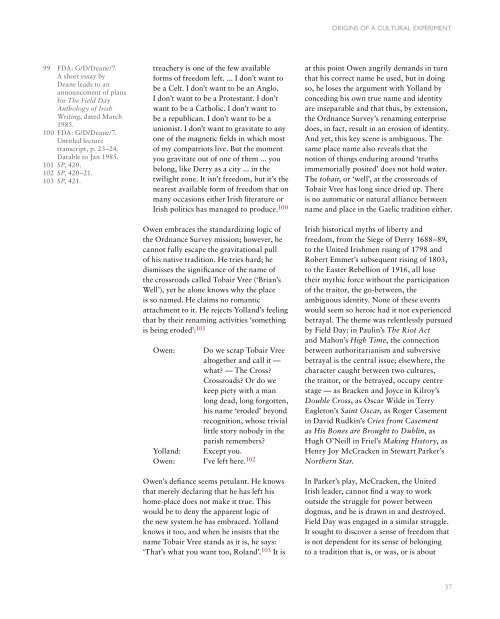cd on translations
cd on translations
cd on translations
You also want an ePaper? Increase the reach of your titles
YUMPU automatically turns print PDFs into web optimized ePapers that Google loves.
99 FDA: G/D/Deane/7.<br />
A short essay by<br />
Deane leads to an<br />
announcement of plans<br />
for The Field Day<br />
Anthology of Irish<br />
Writing, dated March<br />
1985.<br />
100 FDA: G/D/Deane/7.<br />
Untitled lecture<br />
transcript, p. 23–24.<br />
Datable to Jan 1985.<br />
101 SP, 420.<br />
102 SP, 420–21.<br />
103 SP, 421.<br />
treachery is <strong>on</strong>e of the few available<br />
forms of freedom left. ... I d<strong>on</strong>’t want to<br />
be a Celt. I d<strong>on</strong>’t want to be an Anglo.<br />
I d<strong>on</strong>’t want to be a Protestant. I d<strong>on</strong>’t<br />
want to be a Catholic. I d<strong>on</strong>’t want to<br />
be a republican. I d<strong>on</strong>’t want to be a<br />
uni<strong>on</strong>ist. I d<strong>on</strong>’t want to gravitate to any<br />
<strong>on</strong>e of the magnetic fields in which most<br />
of my compatriots live. But the moment<br />
you gravitate out of <strong>on</strong>e of them ... you<br />
bel<strong>on</strong>g, like Derry as a city ... in the<br />
twilight z<strong>on</strong>e. It isn’t freedom, but it’s the<br />
nearest available form of freedom that <strong>on</strong><br />
many occasi<strong>on</strong>s either Irish literature or<br />
Irish politics has managed to produce. 100<br />
Owen embraces the standardizing logic of<br />
the Ordnance Survey missi<strong>on</strong>; however, he<br />
cannot fully escape the gravitati<strong>on</strong>al pull<br />
of his native traditi<strong>on</strong>. He tries hard; he<br />
dismisses the significance of the name of<br />
the crossroads called Tobair Vree (‘Brian’s<br />
Well’), yet he al<strong>on</strong>e knows why the place<br />
is so named. He claims no romantic<br />
attachment to it. He rejects Yolland’s feeling<br />
that by their renaming activities ‘something<br />
is being eroded’: 101<br />
Owen: Do we scrap Tobair Vree<br />
altogether and call it —<br />
what? — The Cross?<br />
Crossroads? Or do we<br />
keep piety with a man<br />
l<strong>on</strong>g dead, l<strong>on</strong>g forgotten,<br />
his name ‘eroded’ bey<strong>on</strong>d<br />
recogniti<strong>on</strong>, whose trivial<br />
little story nobody in the<br />
parish remembers?<br />
Yolland: Except you.<br />
Owen: I’ve left here. 102<br />
Owen’s defiance seems petulant. He knows<br />
that merely declaring that he has left his<br />
home-place does not make it true. This<br />
would be to deny the apparent logic of<br />
the new system he has embraced. Yolland<br />
knows it too, and when he insists that the<br />
name Tobair Vree stands as it is, he says:<br />
‘That’s what you want too, Roland’. 103 It is<br />
ORIGINS OF A CULTURAL EXPERIMENT<br />
at this point Owen angrily demands in turn<br />
that his correct name be used, but in doing<br />
so, he loses the argument with Yolland by<br />
c<strong>on</strong>ceding his own true name and identity<br />
are inseparable and that thus, by extensi<strong>on</strong>,<br />
the Ordnance Survey’s renaming enterprise<br />
does, in fact, result in an erosi<strong>on</strong> of identity.<br />
And yet, this key scene is ambiguous. The<br />
same place name also reveals that the<br />
noti<strong>on</strong> of things enduring around ‘truths<br />
immemorially posited’ does not hold water.<br />
The tobair, or ‘well’, at the crossroads of<br />
Tobair Vree has l<strong>on</strong>g since dried up. There<br />
is no automatic or natural alliance between<br />
name and place in the Gaelic traditi<strong>on</strong> either.<br />
Irish historical myths of liberty and<br />
freedom, from the Siege of Derry 1688–89,<br />
to the United Irishmen rising of 1798 and<br />
Robert Emmet’s subsequent rising of 1803,<br />
to the Easter Rebelli<strong>on</strong> of 1916, all lose<br />
their mythic force without the participati<strong>on</strong><br />
of the traitor, the go-between, the<br />
ambiguous identity. N<strong>on</strong>e of these events<br />
would seem so heroic had it not experienced<br />
betrayal. The theme was relentlessly pursued<br />
by Field Day: in Paulin’s The Riot Act<br />
and Mah<strong>on</strong>’s High Time, the c<strong>on</strong>necti<strong>on</strong><br />
between authoritarianism and subversive<br />
betrayal is the central issue; elsewhere, the<br />
character caught between two cultures,<br />
the traitor, or the betrayed, occupy centre<br />
stage — as Bracken and Joyce in Kilroy’s<br />
Double Cross, as Oscar Wilde in Terry<br />
Eaglet<strong>on</strong>’s Saint Oscar, as Roger Casement<br />
in David Rudkin’s Cries from Casement<br />
as His B<strong>on</strong>es are Brought to Dublin, as<br />
Hugh O’Neill in Friel’s Making History, as<br />
Henry Joy McCracken in Stewart Parker’s<br />
Northern Star.<br />
In Parker’s play, McCracken, the United<br />
Irish leader, cannot find a way to work<br />
outside the struggle for power between<br />
dogmas, and he is drawn in and destroyed.<br />
Field Day was engaged in a similar struggle.<br />
It sought to discover a sense of freedom that<br />
is not dependent for its sense of bel<strong>on</strong>ging<br />
to a traditi<strong>on</strong> that is, or was, or is about<br />
37


